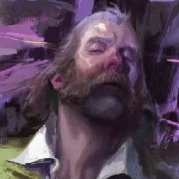Everything posted by VoivodBG
-
Block Out
1997 - Live Zajecar 28.06.97 01 - Ja ne zelim da odes 02 - Elektroliza 03 - Deponija 04 - Trenje 05 - Vertikalno gledano 06 - Sekira 07 - Rodjendanska pesma 08 - Carobni akord 09 - Nedostupna polja 10 - Neki moji drugovi 11 - Kad hodam 12 - Postar 13 - Manastir 14 - Tri korne 15 - SDSS 16 - U pola 9 http://rapidshare.com/files/106739735/1997_-_Live_Zajecar_28.06.97.part1.rar http://rapidshare.com/files/106745325/1997_-_Live_Zajecar_28.06.97.part2.rar pass: rapidserbia.com
-
Goribor
Goribor će 8. decembra (ponedeljak) održati koncert u zagrebačkom klubu Aquarius. Frontmen Aleksandar Stojković St za Popboks kaže da će grupa nastupiti u sada već standardnoj, četvoročlanoj postavi, i da će možda biti upriličen i nastup Babilonaca. Planiraju se i koncerti u Sloveniji, ali St kaže da se ništa ne zna - "prvo vize". Stojković se, inače, ovih dana bavi muzikom za dokumentarne filmove: upravo je završio rad na dokumentarcu o pulskoj ex-kasarni Rojc, a za početak iduće godina planira rad na filmu o organizovanim ljubiteljima Krišne. Kaže da je rad na filmskoj muzici dosta delikatan - "bole oči i leđa, ali je u svakom slučaju bolje od branja kupusa i celera, po istom ovom vremenu." Pretprodajna cena ulaznice za koncert u Aquariusu (Aleja Matije Ljubeka b.b.) je 40 kuna (oko 550 dinara); na dan koncerta, karta će biti skuplja za 10 kuna. Početak je najavljen za 21 h.
-
Horor filmovi
RE3 pretesko sranje, cak ni mila Mila Jovovic ga ne vadi... Salem's lot, koju verziju? Ako je ova nova sa Rob Lowe-om i matorim Sutherlendom, ondak nije losa... Alone in The Dark je Uwe Boll-ov Disaster piece, obavezno da ga gledas ako si navikao vec na njegovo sakacenje video igara. Exorcist, hm, ne ocekuj previse od filma, limunada je, inace postoje dve verzije filma, druga se zove dominion prequel to exorcist.... @Nele, evo jos linkova jedan od njih mora da radi. http://rapidshare.com/files/128548823/Citizen_X__1995_.part1.rar http://rapidshare.com/files/128549667/Citizen_X__1995_.part2.rar http://rapidshare.com/files/128550486/Citizen_X__1995_.part3.rar http://rapidshare.com/files/128545777/Citizen_X__1995_.part4.rar http://rapidshare.com/files/128546659/Citizen_X__1995_.part5.rar http://rapidshare.com/files/128547426/Citizen_X__1995_.part6.rar http://rapidshare.com/files/128548042/Citizen_X__1995_.part7.rar http://rapidshare.com/files/76369575/Citizen_X.part1.rar http://rapidshare.com/files/76382556/Citizen_X.part2.rar http://rapidshare.com/files/80087248/Citizen_X.part3.rar http://rapidshare.com/files/80102080/Citizen_X.part4.rar http://rapidshare.com/files/80114842/Citizen_X.part5.rar http://rapidshare.com/files/80128076/Citizen_X.part6.rar http://rapidshare.com/files/80140897/Citizen_X.part7.rar http://rapidshare.com/files/80145224/Citizen_X.part8.rar pass : www.uyurgezer.net
- tema za pedere i dukatlije (random)
-
HIP-HOP
Artist: Busdriver Album: Roadkillovercoat Genre: Abstract Hip-Hop / Alternative Hip-Hop / Underground Hip-Hop Country: United States Tracklist: 01 Casting Agents and Cowgirls 02 Less Yes's, More No's 03 Kill Your Employer (Recreational Paranoia Is The Sport Of Now) 04 Ethereal Driftwood 05 Secret Skin 06 Sun Shower 07 Go Slow 08 The Troglodyte Wins 09 Pompous Posies! Your Party's No Fun 10 (Bloody Paw On The) Kill Floor 11 Mr. Mistakes (Bested By The Whisper Chasm) 12 Dream Catcher's Mitt http://rs9.rapidshare.com/files/161221964/BUS_www.MediaPortal.ru.rar
-
tema za pedere i dukatlije (random)
daïtro diskografija http://rapidshare.com/files/152638573/Daitro-Des_Cendres_Je_Me_Consumme-FR-2003-hXc.rar http://rapidshare.com/files/152638189/VA-Raein-Lhasa-Daitro-The_Harsh_Words_As_The_Sun-3_Way_Split-2004-hXc.rar http://rapidshare.com/files/152635882/VA-Raein-Daitro-Split-_10_Inch_-2004-FNT.rar http://rapidshare.com/files/152636375/Daitro-Laisser_Vivre_Les_Souelettes-_FR_-2005-FNT.rar http://rapidshare.com/files/152635077/Daitro-US_Tour-_7_Inch_Vinyl_-2007-FNT.rar http://rapidshare.com/files/152635505/VA-Daitro-Sed_Non_Satiata-Split_CD-FR-2008-hXc.rar
-
Pero Defformero
Mislio sam bas na taj album. Pitao sam preko Piknik spejsa za album i bas su mi preneli tu informaciju da ce novi album biti u decembru, a da je ova svirka u stvari predpromocija istog, i naravno bice i pesama sa prvog albuma, kul.
-
Horor filmovi
Citizen X http://rapidshare.com/files/5201206/CitizenX_1995_Xvid.com.part1.rar http://rapidshare.com/files/5200817/CitizenX_1995_Xvid.com.part2.rar http://rapidshare.com/files/5200685/CitizenX_1995_Xvid.com.part3.rar http://rapidshare.com/files/5200635/CitizenX_1995_Xvid.com.part4.rar http://rapidshare.com/files/5196521/CitizenX_1995_Xvid.com.part5.rar http://rapidshare.com/files/5196421/CitizenX_1995_Xvid.com.part6.rar http://rapidshare.com/files/5196350/CitizenX_1995_Xvid.com.part7.rar http://rapidshare.com/files/5187129/CitizenX_1995_Xvid.com.part8.rar Evilenko http://rapidshare.com/files/137260086/3v1l3nk0.part1.rar http://rapidshare.com/files/137260124/3v1l3nk0.part2.rar http://rapidshare.com/files/137260091/3v1l3nk0.part3.rar http://rapidshare.com/files/137260103/3v1l3nk0.part4.rar pass: bloodlimbo
- tema za pedere i dukatlije (random)
-
Horor filmovi
dokumentarci Serial Killers The Real Hannibal Lecters Cannibal filmovi Citizen X Evilenko
-
Watchmen (2009)
Dr. Manhattan izgleda presmesno. P.S. I na sta lici Rorschach, kepec bre!
-
Domaci Dens 90-ih
Bony&Clyde - Necu u raj(1998) 01 Trip 02 Pada kisa 03 Don KApelo 04 Lutkica od plisa 05 Necu u raj 06 Djavo bele boje 07 Sada kajem se 08 Aladin's party http://rapidshare.com/files/106583611/Bony_Clyde_-_Necu_u_raj_1998_.rar A za ostale sladokusce: YU Dance of 90's Vol. 1 01. Funky House Band - Ritam Za Ludilo 02. Dee Monk - Samo Zelim Da Znam 03. Colonia - Red Light Zone 04. E.T. - Tek Je 12 Sati 05. Basa & Deki - Idemo Dalje 06. Dr. Nele Karajlic - Pit Bull 07. Acme - Crni Je Zvuk Za Svaki Struk 08. Mars Venus & Bata - A Sta Bi Bilo 09. Elektra - Iznenadi Me 10. Luna - Plava Vestica 11. Dr. Iggy - Kada Dodje Kraj 12. Dobar, Los, Zao - Zurka 13. Duck - Poljubi Me 14. Energija - Malo Sutra 15. Gala & Srdjan Moby Dick - Izaberi 16. Funky G - Samo U Snu 17. Ella B. - Ajkula 18. Djogani Fantastiko - Idemo Na Mars 19. Moby Dick - Kralj Kokaina 20. Twins - 30 Dana Robije 21. Knez - Ti Si Kao Magija http://rapidshare.com/files/127977044/YU_Dance_of_90_s_vol_1..rar Pass: balkanddl.net YU Dance of 90's Vol. 2 01. Emilija - Ja Sam Bila S Njim 02. Beat Street - Snezana 03. Luna - Devet I Po Nedelja 04. Funky G. - Plakati Zauvek 05. Dr. Iggy - Pusti Me Da Zivim 06. Gala - U Oci Me Pogledaj 07. Models - Sexy-Taxi 08. Moby Dick - Duzna Si Mi Ostala 09. Djogani Fantastiko - Povreatak Sa Marsa 10. B3 - Govorim O Ljubavi 11. K2 - Ajmo U Zivot 12. Prslook Band - Objektivne Lazi 13. Lina - Bumbar 14. Non + Ultra - Licitacija 15. Dajana - Sto Te Nema 16. Duck - Ja Imam 17. Romana - Prava Zena 18. Rango - 10 Dana 19. Knez & Deni - Hajde Ljubavu 20. Hani - Otkini Baby http://rapidshare.com/files/128008693/YU_Dance_of_90_s_Vol._2.rar pass: balkanddl.net YU Dance of 90's Vol. 3 01. Fokus - Samo Jednom Nije Dovoljno 02. Dino Merlin & Ivana Banfic - Godinama 03. Alpha Team - Nista Novo Sa Nama 04. Bony & Clyde - Lutkica Od Plisa 05. Dr. Iggy - Kazi Mi 06. Knez & Branislav Lecic - Bubamara 07. Magazin - Ginem 08. Dr. Iggy - Kao Pre 09. Tap 011 - Okreni Broj 95 10. Gala - Smrtna Kazna 11. Moby Dick - Ljubomoran 12. Ksenija Mijatović - Daj Mi Ovu Noc 13. Fokus - Nisam Trebala To 14. Funky G - Zao Mi Je, Zao 15. Glorija - Drugacija 16. Luna - Ne Ostavljaj Me 17. Alpha Team - Ne Zelim Kraj 18. Tap 011 - Tvoja Mala Lujka 19. Andjela & Drazen Zecic - Ima Li Nade Za Nas 20. Dr. Iggy - Oci Boje Duge http://rapidshare.com/files/128194186/YU_Dance_of_90_s_Vol._3.rar pass: balkanddl.net YU Dance of 90's Vol. 4 (rap time) 01. Gru, 357, Who Is The Best, Ana Stanic, Ivana & ACME - Zemljo 02. Voodoo Popeye - RAP Sodia 03. Gru - Pravo U Raj 04. 187 - Princeza Sa Asfalta 05. Bony & Clyde - Djavo Bele Boje 06. Sha-Ila - Bebo 07. C-Ya - Sam Protiv Svih 08. Ding Dong - Pazzi (Demo 96) 09. Who Is The Best - Wellcome To Belgrade 10. Voodoo Popeye - Otmicar 11. 187 - macke 12. C-YA - Jelena 13. Ding Dong - Luda Igra 14. Monteniggers - Mladi Pistolero 15. Who Is The Best - Otvori Nebo Za Mene 16. Gru - Da Li Imas Pravo 17. 187 - Otela Ga Tama 18. Monteniggers - Voljeli Bi Da Si Tu 19. 187 Feat. Ding Dong - Beskrajan San 20. Voodoo Popeye - Karantin 21. C-YA - Kad Se Vozimo http://rapidshare.com/files/128223603/YU_Dance_of_90_s_Vol._4.rar pass: balkanddl.net YU Dance of 90's Vol. 5 (Turbo Folk) 01. Ivan Gavrilović - 200 Na Sat 02. Džej - Sexy Ritam 03. Željko Šašić - Crna Ženo 04. Ceca & Mira Škorić - Ne Računaj Na Mene 05. Jami - Šibica 06. Nino - Šta Ću Mala S Tobom 07. Saša Popović - Giljam Dade 08. Mira Škorić - Otkači 09. Ceca - Volim Te 10. Vesna Zmijanac - Idem Preko Zemlje Srbije 11. Snežana babić Sneki - Moju Vruće Haljine 12. Ivan Gavrilović - Pevaj 13. Džej - Mrak, Mrak 14. Slaviša Vujić - Crnooka 15. Zorica Brunclik - Branili Su Našu Ljubav 16. Viki - Koka Kola, Malboro, Suzuki 17. Jami - Čokolada 18. Ceca - Zaboravi 19. Nino - Usne Vrele Kao Žar 20. Željko Šašić - Gori More 21. Dragana Mirković - Do Poslednjeg Dana http://rapidshare.com/files/128490846/YU_Dance_Of_90_s_Vol._5__Trubo_Folk_.rar pass: balkanddl.net YU Dance of 90's Vol. 6 01. Otpor - Spasi Srbiju I Ubi Se, Slobodane 02. Indexovo Pozriste - Zadnji Voz Za Srbiju 03. Djordje Balasevic - Ziveti Slobodno... 04. Riblja Corba - Nojeva Barka 05. Van Gog - Neko Te Ima Nocas 06. Familija - Mala 07. Trinidad - Ona Hoce Mambo 08. Ruz - Nemica 09. Vampiri - Volim Je Ja 10. Zana - Nisam, Nisam 11. Ana Stanic - Grad 12. Riblja Corba - Gastarbajterska 2 13. Atheist Rap - Wartburg LImuzina 14. Rambo Amadeus - Alo Pozega 15. Familija - Boli Me Kita 16. Djordje Balasevic - Legenda O Gedi Gluperdi 17. Zeljko Bebek - Ja Ne Pijem Sto Se Meni Pije 18. Hari Mata Hari - Pusti Me, Boze, Pusti Me 19. Ana Stanic - Tockovi 20. Familija - Pa, Pa, Paranoja 21. Rambo Amadeus & Knez - Djede Niko http://rapidshare.com/files/128921155/YU_Dance_Of_90_s_Vol._6.rar pass: balkanddl.net YU Dance of 90's Vol. 7 01. Beat Street - Snegovi Dolaze 02. Axel - Danima 03. Mandi - U Svemu Naj Naj 04. W-Ice & Power Team - Gde Si Ti 05. Non + Ultra - Bez Tebe 06. May Day - Ostani Tu 07. Lina - Slutim Da Je Kraj 08. Djogani Fantastiko - Leto Je 09. Moby Dick - Padrino 10. Funky G - Ona Ljubi Te 11. Leontina - Jedna Od 100 12. Dr. Iggy - Uzalud Se Trudim 13. Tap 011 - Vuk 14. Monteniggers - Ducka Diesel 15. K2 - Dzangl Manija 16. Duck - Ljubavni Napitak 17. Oliver Stoiljkovic - Strah Od Ljubavi 18. Rastko - Bicu Tata 19. Dobar, Los, Zao - Imacemo Bebu 20. Gala - Vrati Se 21. Hani - Kocka Od Secera http://rapidshare.com/files/128979942/YU_Dance_Of_90_s_Vol._7.rar pass: balkanddl.net YU Dance of 90's Vol. 8 01. Dino Merlin - Kremen 02. Severina & Leo - Kreni 03. Alka Vujica - Ola, Ola E 04. Luna - Samo Jednu Noc 05. Gala - Snage Mi Daj Boze 06. Leontina - Stalno Mislis O Njoj 07. Zeljko Joksimovic - 7 Godina 08. Moby Dick - Brate 09. Doris Dragovic - To 10. Tap 011 - Zbog Tebe (Gace) 11. Lina - Kasika 12. Acme & Leontina - Zasluzio Si Sve 13. OK Band - A U Medjuvremenu 14. Seven Up - Probudi Me 15. Colonia - Lady Blue 16. E.T. - Ja Ti Priznajem 17. Models - Noc Je Vedra Nad Srbijom 18. May Day - Ja Samo Zelim Nekog 19. Zorana - Zetva 20. Beat Street - Opsesija 21. Code 71588 - Neka Svira Stvar http://rapidshare.com/files/129009016/YU_Dance_Of_90_s_Vol.8.rar pass: balkanddl.net YU Dance of 90's Vol. 9 01. Vlado Georgijev & Igor Lazic - Ne Brze Od Zivota 02. Maja Nikolic - Ako Verujes 03. Luna - Zeleno 04. Duck - San 05. Dr. Iggy - Samo Ti 06. Rango - Buongiorno 07. Osvajaci - Vino Crveno 08. Dar Mar - Daj Mi Vina 09. Colonia - Vatra I Led 10. Moby Dick - Ulica I Broj 11. Knez - Brzi Voz 12. Alka Vujica - Opet Volim 13. Noc I Dan - Korak Sam Do Ludila 14. Ivan gavrilovic - Hocu Sa Tobom Da Djuskam 15. Severina - Ajde, Ajde, Zlato Moje 16. Luna & Ceca - Drugarice 17. E.T. - Da Ti Nisam Bila Dovoljna 18. Colonia - Dio Nje 19. Beat Street - Osveta 20. Tap 011 - Televizor 21. Mag - Samo Jedan Put Postoji http://rapidshare.com/files/129031528/YU_Dance_Of_90_s_Vol._9.rar pass: balkanddl.net
-
Megadeth
Prodajem System has failed, original, odlicno ocuvan za 600 dinara, kontakt na pm.
-
Linkovi za download albuma
Novi outlaw order album bilo ko?
-
Pero Defformero
Da li ce moci da se pazari album na koncertu? Ovde u Beogradu ga nema nigde...
-
Amenra
Ruski uploader, meni ne stvara problem kada skidam nesto sa njega, kao recimo na prime ifolder. Cim otvoris link, dole ces videti, brojke, upises ih, i onda kliknes na zeleno dugme (skacatelj), onda se izbaci link, ali odmah ispod njega odstiklirajte ono ispod, jer ce hteti da vam uvali ruski toolbar...
-
Amenra
Nastali u zabitim poljima zapadne flandrije (West-Flanders) (Kortrijk, Belgija), Amenra su zakuvavali svoje proklete spevove od 1999 godine... Dajuci slusaocima viziju njihovog prikaza danasnjeg sveta, koji je izgubio dodir sa svojim prosloscu, sadasnjosti i buducnosti, kroz jereticne rituale prozetim mistikom nepoznatog... U njihovoj muzici se moze cuti dosta drone momenta, ponavljajucih rifova koji kao neka jaka nevidljiva sila zabadaju slusaoca u stomak i ne ostavljaju ga ravnodusnim posle toga... Amenra imaju taj adut, da zvuce mnogo dobro uzivo, dok se njihovi zvuci prozimaju crkvom (da sviraju u starim crkvama, brdovitim grobljima, mracnim sumama, pa cak i eroticnim modnim vecerima zenskog donjeg vesa) a publika se baca u trans (zbog same muzike koja uzima maha, a i same lokacije) i u stanju zadovoljstva i magnovenja odlazi sa koncerata kuci, zadovoljena... Binu su delili sa raznim bendovima: Red Sparowes, The Locust, Pelican, Knut, The Dillinger Escape Plan, Cursed, Anodyne itd. Bend su dosta poredili sa titanima Neurosis-om i Isis-om, ali ipak njihov pozitivno/negativan vajb koji se prozima kroz miks nerealnih melodija izvrnutih ritmova koji se konstantno premestaju, dok ih prate nabadacki rifovi i dinamicnost koja bukvalno melje sve pred sobom, ipak im daje sopstveni identitet i zvuk. http://www.myspace.com/amenra http://www.churchofra.com/ Amenra -- Mass I: Prayer I - VI - 2003 01. Change Is Always (04:23) 02. Dance Of The Dead (05:49) 03. Discrimen (02:05) 04. Hibernate (03:59) 05. Silent Pause (05:32) 06. Ode to a Broken Doll (04:56) http://narod.ru/disk/1229049000/Amenra%20--%20Mass%20I%20%20Prayer%20I%20-%20VI%20-%202003.rar.html Amenra -- Prayers 9 + 10 (12"EP) - 2004 01. Prayer 10 : From Birth to Grave (06:34) 02. Prayer 9 : Ritual (08:01) http://narod.ru/disk/1229673000/Amenra%20--%20%20Prayer%20IX%20-%20%20Prayer%20X%20(12%27%27EP)%20-%202004.rar.html Gameness/Amen Ra/Gantz/Vuur -- 4-Way Split - 2004 01. Gameness - Ressucites Et Remeurs (05:59) 02. Gameness - Immobile Destinee (03:42) 03. Amen Ra - A Promise To Make (04:16) 04. Amen Ra - Offerande (This Is The Body Of Christ) (04:00) 05. Gantz - Hors Conditions (La Melodie Du Chaos) (07:05) 06. Gantz - Porte Par Le Vide (05:09) 07. Vuur - State One (01:58) 08. Vuur - Dying Breed (03:07) 09. Vuur - Bitter (01:56) http://narod.ru/disk/541640000/Gameness%20-%20AmenRa%20-%20Gantz%20-%20Vuur%20--%20Split%20-%202004.rar.html Amenra -- Mass II: Sermons (EP) - 2005 01. Prayer 8: From Birth To Grave (05:42) 02. Prayer 9: Offerande (03:56) 03. Prayer 10: Ritual (10:32) http://narod.ru/disk/1230100000/Amenra%20-%20Mass%20II%20Sermons%20-%202005.rar.html Amenra -- Mass III - 2005 01. The Pain. It Is Shapeless. We Are your Shapeless Pain (10:17) 02. Nemelendelle. Twuhste en Tljiste (07:28) 03. Die Strafe. Am Kreuz. Ich Schreibe eine Bibel in Blut (07:11) 04. Le Fils des Faux. Il Fallait Que Je Parte pour Que Tu Viennes (07:59) 05. From Birth To Grave From Shadow To Light (05:43) 06. Ritual (08:00) http://narod.ru/disk/1254887000/Amenra%20--%20%20Mass%20III%20-%202006.rar.html Amenra/Hitch -- Split (7"EP) - 2007 01. Amenra - Razoreater (05:42) 02. Hitch - Slavonski Brod (03:56) http://narod.ru/disk/1274888000/Amenra%20-%20Hitch%20-%20Split%20(7%27%27)%20-%202007.rar.html Amenra -- Mass IIII - 2008 01. Silver Needle/Golden Nail (08:24) 02. Le Gardien des Rкves (04:26) 03. De Dodenakker (10:01) 04. Terziele (02:46) 05. Razoreater (06:49) 06. Aorte. Nous Sommes du Mкme Sang (09:01) 07. Thurifer, et Clamor Ad te Veniat (06:43) http://narod.ru/disk/1294133000/Amenra%20--%20Mass%20IIII%20-%202008.rar.html Pass : FunkySouls.com
-
Horror Piknik
PIKNIK LIVING ROOM
-
The Prodigy
Hi everyone It's the news we have all been waiting for. We can now tell you the new album is called "Invaders Must Die" and will be released on The Prodigy's imprint, Take Me To The Hospital, through Cooking Vinyl, on March 2nd. Liam Howlett, Keith Flint and Maxim all feature on the album, which is the first time since the release of Fat Of The Land in 1997. The result is back to their bone shaking best, a collision of old skool rave noise with the stratospheric limits of new technology. .
-
Metallica
Idi u b92 shop u makedonskoj, to ti je ona mala radnjica iza doma omladine, imali su nekoliko komada....
-
Linkovi za download albuma
Coalesce - There Is Nothing New Under The Sun + [Hydra Head Records HYH-135-2] CD-_Reissue 2007 http://rapidshare.com/files/160273268/Coalesce_-_There_Is_Nothing_New_Under_The_Sun____Hydra_Head_Records_HYH-135-2__CD-_Reissue_2007.rar.html
-
Agoraphobic Nosebleed
VA-Agoraphobic_Nosebleed-Insect_Warfare-Split-2008-hXc Genre: Metal Storedate: 2008-00-00 Label: Relapse Records Catnum: SS81 Source: CD Playtime: 0h 05min total Encoder: LAME 3.97 (-V2 --vbr-new) Bitrate: 217 kbps avg Size: 10.18 MB Tracklist 1. Agoraphobic Nosebleed - Part I Crypto-Zoology 0:45 2. Agoraphobic Nosebleed - Part II Werewolf Women Of The U.S 0:08 3. Agoraphobic Nosebleed - Part III Dis-Order Of Species 1:33 4. Agoraphobic Nosebleed - Part IV Un-Natural Selection 1:04 5. Insect Warfare - Human Virus Ballistic 0:24 6. Insect Warfare - Technology War 0:27 7. Insect Warfare - Corporation Life Form 0:20 8. Insect Warfare - Digital Target 0:40 9. Insect Warfare - F.T.L. 0:15 10. Insect Warfare - Deception Fortress 0:23 11. Insect Warfare - Coded Steel 0:00 05:59 http://rapidshare.com/files/161007168/ble.rar
- HIP-HOP
-
Koji ste poslednji original CD nabavili?
Hain Teny - Haintelligence Hain Teny - Roba Tibia - One in every second
-
Linkovi za download albuma
http://rapidshare.com/files/160606516/TTSIBP2008_www.MediaPortal.ru_.rar Scott Weiland - Happy In Galoshes [Advance] - 2008 - RVP http://rapidshare.com/files/160566492/SW-HIG-A-08-RVP.rar Pass: scened




